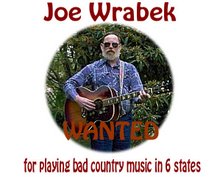There was a well-publicized article in the Nashville Tennesseean about what’s wrong with country music today (it was nice to see somebody in Music City talking about this—a lot of people outside Music City have been talking about it for a long time). The premise was that all these songs about how wonderful it is to be a country boy or girl were written and performed by people who’ve never lived in the country, and don’t have a clue what they’re gushing about. All probably true.
I have a different idea about what’s wrong with country music, of course (and I did write a song about it—“Hank’s Song,” which was on the Santa’s Fallen album—the recording is at http://www.soundclick.com/share?songid=2794921). But the article does beg the question, “What exactly is country music?”
I’m a latecomer to country music, myself; I discovered rock ‘n’ roll in high school (my girlfriend and her friends were listening to it), and rock ‘n’ roll is still my favorite music to listen to. However, the Dodson Drifters—the “bluegrass punk” band that was little (pop. 50) Dodson, Oregon’s only claim to fame—played country music (with a lead singer who sounded and looked like Willie Nelson, we had to play country music), and I gradually developed an appreciation for it. And it is mostly what I write.
Perhaps an answer to “What is country music?” has to start with “Well, why do you write it?” I am fond of quoting Steve Goodman’s definition of country music—“It’s about Mother, trucks, trains, farms, prison, dead dogs and Christmas”—and I’ll periodically tell audiences, “This is a country music song ‘cause it’s got a dead dog and a truck in it.” But it goes deeper than that.
Country music tends toward very specific imagery. Even abstract concepts—and I’ve sung about those—are dealt with in terms of real people doing specific things. “Up close and personal,” as it were. No, it doesn’t have to be about life in the country—though I’ll often throw in country-boy imagery just for fun, noting (for instance) in “Naked Space Hamsters in Love” that a spaceship looks like “a silo with a shiny, pointy nose.”
It’s literate (yes, even with those drawls and “ain’ts”). Country music respects the intelligence of its listeners, assuming they are well-read (if not well-educated); its “cultural shorthand” is peppered with Biblical, Shakespearean and other references in full confidence that the audience will “get it” (and they always do). Other genres don’t do that. One trick I picked up from “Tampa Stan” Good was tossing polysyllabic words and foreign words and phrases into country music songs off-handedly (and always conversationally). “Copulating” in a country-music song? Of course. Why not?
Country music is self-deprecating, too. Us country folks do not mind making fun of ourselves. (And again, other genres seem to take themselves way too seriously.)
And country music can tackle social issues—though it’s not used much that way. Country music is an ideal vehicle for this, because the specificity—framing the message in terms of real things happening to real people—makes the message impossible to ignore. Perhaps the fact that country music doesn’t often get used to talk about issues gives it more of an impact when it is. People don’t expect it. (And I do like to hand folks the unexpected.)
So yes, the “suits” have gotten it all wrong—focusing (again, I think) on appearances and not looking further. (And so, be it noted, did the newspaper reporter.) That’s probably an outgrowth of the “eye candy” fixation that developed as Nashville some years back tried to imitate MTV. Like Danny the Dog (played by me) said in one of his radio interviews, “Everybody’s got to be young and pretty, like on the Disney Channel.” One can at least ignore them as irrelevant, and like Danny, go play with a Frisbee instead.
Joe
WELCOME...
This blog is the outgrowth of a songwriting workshop I conducted at the 2006 "Moograss" Bluegrass Festival in Tillamook, Oregon. It presumes that after 30-odd years of writing and playing music, I might have something to contribute that others might take advantage of. If not, it may be at least a record of an entertaining journey, and a list of mistakes others may be able to avoid repeating.
This blog is intended to be updated weekly. In addition to discussions about WRITING, it will discuss PROMOTION--perhaps the biggest challenge for a writer today--as well as provide UPDATES on continuing PROJECTS, dates and venues for CONCERTS as they happen, how and where to get THE LATEST CD, the LINKS to sites where LATEST SONGS are posted, and a way to E-MAIL ME if you've a mind to.
Not all these features will show up right away. Like songwriting itself, this is a work in progress. What isn't here now will be here eventually. Thank you for your interest and your support.
Subscribe to:
Post Comments (Atom)



No comments:
Post a Comment